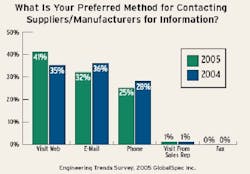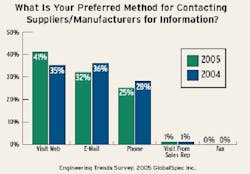Automation buyers dissatisfied with suppliers' online responses
RESULTS OF a July 2005 study revealed problems in the way many industrial suppliers respond to product and service-related inquiries from prospective buyers, particularly when requesting information by e-mail. Only 20% of respondents say they receive data requested from suppliers consistently (which was defined as 95% of the time), while 43% report waiting three to seven days to receive a response to their e-mail inquiries.
|
Fourth Annual Industrial Indicator Survey Results Summer 2005 |
Additional findings from GlobalSpec's mid-year 2005 surveys:
- Twenty-two percent say their companies increased prices in 2005, compared to 16% in 2004
- Fifty-five percent say that improving production efficiencies is the top operating issue facing their company, followed closely by improving quality (52%), lowering raw material costs (51%), and speeding new product development (49%). Only 34% cited rising energy costs as a source of worry, while just 20% say offshore competition is a key concern.
- Forty-seven percent say they expect to see a shortage of newly-licensed engineers entering the field over the next five years.
Results from the surveys can be accessed at www.globalspec.com/GSSurveyResults0805.


